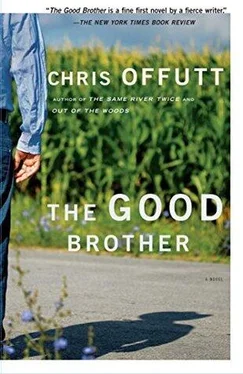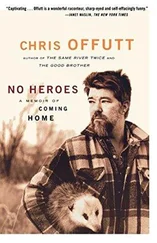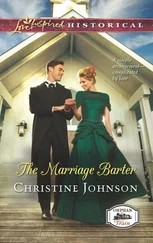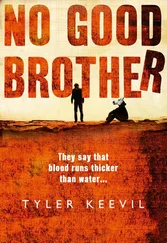He tilted on the stool to pull a gold coin from his pocket and passed it to Joe. It was very heavy.
“Fifty years ago,” Coop said, “twenty of those would buy a new car. It’s the same now. Twenty still gets a car. That don’t work with cash.”
Joe placed the coin on the bar, wishing he had one. He’d never owned a new car and couldn’t recall anyone who had. He’d always heard that two years old was the best buy. He wondered how many gold coins that would take.
The two pool players joined them from the back. One was a wiry kid who moved in reckless jerks as if attacking the air that surrounded his body. The other man looked a few years older than Joe and also wore a Bills cap.
“Found a friend. Coop?” he said.
“just a beer buddy.”
“Coop don’t get a chance to talk much,” the man said.
“He was doing all right,” Joe said.
“Usually does. Was he going on about gold?”
Coop’s chin rose and his eyes closed down as if they had flaps.
“Damn straight,” he said. “There’s a trillion dollars on paper in the world, but only a billion cash. That’s a tiny percent. It’s not money anymore, it’s data.”
“I know it,” the man said.
“This kid don’t. I’m just trying to educate him. Doing a damn fine job until we got interrupted.”
“Aw now, Coop,” the man said. “Let’s all have a beer.” He made a gesture to the bartender, then offered his hand to Joe. “I’m Owen. Coop here is my granddaddy. This is my little brother Johnny. You don’t live around here, do you.”
“Got a cabin up Rock Creek.”
“You rent it off Ty Skinner?”
Joe nodded.
“Is it warm enough?”
Joe shrugged. He didn’t want to complain about the cold, or the cabin, especially since the men knew Ty. No one spoke. Joe had the feeling he’d stepped into a brier patch. He thought of Boyd’s ability to make conversation with anyone, by continuing to talk until someone responded. He’d heard men discuss sports for hours, a habit he’d never understood.
“I guess you all must be big Bills fans,” he said.
The men didn’t answer, which confused him because of the hats.
“I like baseball, myself,” Joe said. “It’s the only sport left where anybody can play. Size don’t matter.”
“It ain’t about football,” Johnny said.
Owen gave his brother a hard-eyed stare, then turned back to Joe. Owen was a big man and Joe didn’t want a problem. He sipped the red beer.
“You must like it private up there,” Owen said.
“I do,” Joe said. “Usually I go to town when I get jumpy, but tonight I came in here,”
“Town?” Coop’s voice held a tone of disgust.
“Yeah. Plenty to see.” Joe glanced at Owen. “Less trouble, too.”
“There’s no trouble,” Owen said. “We just don’t want anybody taking advantage of Coop. Don’t take much for that coin to disappear.”
Joe stood.
“Thanks for the beer,” he said to Coop.
“Don’t let Owen run you off,” Coop said. “It’s just his way.”
“Maybe so. But it ain’t mine.”
Joe left, and as the door swung closed behind him, he heard Owen’s voice quiet the old man’s complaint. Silence hung like a weight in the clear night sky. The Big Dipper aimed its bottom lip north while Orion struggled over the mountain. The parking lot spread into the dusk beneath a marble moon.
Joe’s eyes in the Jeep’s mirror seemed sad. He inspected his new license in the dim shine of the dome light. The eyes were too small to see. He drove to the door of the tavern and rolled his window down.
“I’m Joe Tiller,” he yelled. “I live here, too.”
He drove to town very fast, overtaking every vehicle on the road. Snowflakes the size of quarters vanished against the windshield. He passed through Hellgate Canyon, a narrow entrance to the flat basin of town. Missoula was brightly lit, thick with Friday night traffic. Ranch kids in pickups cruised down Higgins, circled the 4-X sculpture, and drove back through town. The snow was gone and the air was warm. Bare mountains surrounded the town, dark hulks that blocked the sky and held in weather. The gritty air clung to his face.
He entered a bar with no sign. The front half was crowded with old hippies and bikers, Indians, cowboys, and Vietnam veterans. Regulars received every third drink free, signaled by the bartender rapping her knuckles against the wooden bar. On the walls hung framed photographs.
The rear of the tavern held a throng of university students. Many of them carried backpacks with plastic mugs fastened to them by a mountain climber’s carabiner. Some wore shorts with long johns that ran into heavy boots. Hair was either very long or very short.
Joe’s rough appearance made people think he was a local, but the crowd only increased his sense of isolation. He wasn’t sure how to act. Men at home usually drank outside, separate from women. In Montana bars, it seemed as if everyone yelled to be heard above everyone yelling. He ordered a red beer, a drink no one at home would touch, but holding it made him feel as if he belonged.
A man behind him shouted to a woman.
“I’m from California but I’ve been here six years.”
“I’m a native of right here,” she said.
“All your life?”
“Not yet.”
“How long you lived here?”
“Till now.”
“Yeah, right,” the Californian said. “More power to you.” He turned to Joe. “I’m from California but I been here six years. Where you from?”
“Mississippi,” Joe said.
“The river or the state?”
“What?”
“You know, like how people always say about New York. The city or the state?”
“Yeah,” Joe said. “Sure, I know.”
A woman at the bar laughed, spit flying from her mouth. She wore a leather vest and held a cigarette beside her mouth. Her eye was freshly blacked and swollen. Two men squared off by the cigarette machine and backed up like roosters. One shouted “Happy birthday,” and they ran toward each other, heads bent low, arms at their sides. Their heads butted and they bounced apart, grinning madly.
A short, broad man carried a tumbler of Scotch with no ice. He was battered as an old ship, still intact and making headway, people trailing behind him as if drawn by his wake. His voice was a rapid growling rasp. “The shit you see when you don’t have an automatic weapon.”
Joe turned back to the Californian, but he was gone and another man had filled the space.
“Order me a tequila if she looks at you,” he said.
“Okay,” Joe said, “Where’re you from?”
“Albania, but I been here twelve years.”
Everyone tried to compete for a Montana pedigree. It began with old families and worked its way down to the recent arrivals. The longer you’d been in the state, the more deserving you were of living there. Each group of newcomers resented the next and everyone conveniently left the Indians out of the equation. It seemed to Joe that people forgot Americans were allowed to live anywhere in the country, including Montana.
Two men pushed past him and ordered shots of whisky.
“Did you see her eye?” one said.
“I’ve seen better heads on beer.”
The woman with the black eye lurched off her stool. She grabbed the man’s left hand and pointed to his wedding ring.
“I call that a no-pest strip,” she said. “So you can shut your goddam, hole.”
She dropped his hand and veered toward Joe.
“I’m from the South,” he said, “but I been here a month.”
“Anaconda,” the woman said, “but don’t hold that against me.”
A young woman with long brown hair walked through the bar. She was tall, and attractive, and held a basket of roses for sale. A man in a crumpled western hat bought three and handed them at random to nearby women. The seller continued to stand there, and someone nudged the man and told him she was waiting for a tip.
Читать дальше












